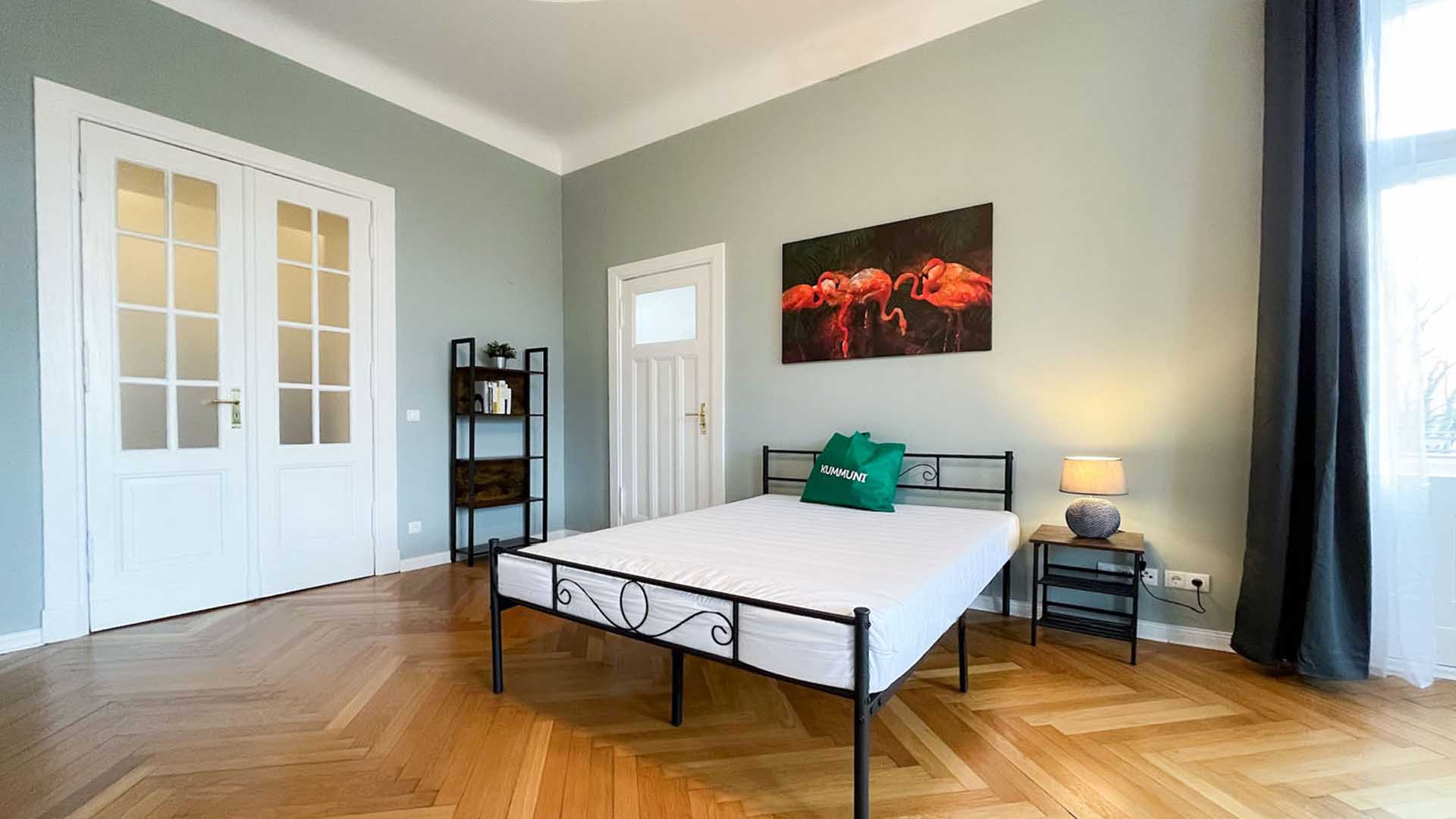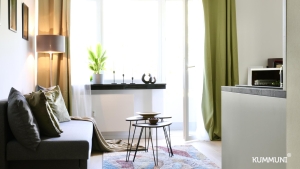Securing affordable student housing Berlin is a significant challenge, given the high demand and limited supply. The city’s allure for students stems from its rich history, vibrant culture, and diverse academic opportunities, making Berlin a preferred destination for learners worldwide. Additionally, The Ultimate Guide to Accommodation in Berlin serves as an invaluable resource for students embarking on the quest for budget-friendly accommodation, offering a range of options from university dormitories to shared apartments and studios.
In light of the growing student population, the student housing market in Germany, particularly in Berlin, has experienced substantial growth. Since 2010, private providers have introduced over 45,000 beds in the 30 largest university cities, highlighting an expansion in the student accommodation sector. Furthermore, The Hertie School plays a pivotal role in easing students’ accommodation search by providing essential information and tips, and by facilitating housing support for international guests through its accommodation partner, Erasmus Play.
Student Housing Berlin: Tips for Finding Cheap Rooms in Berlin
Streamlining the Search Process
- Define Your Criteria: Start by listing what you need in student accommodation, including budget, location, and amenities. This clarity will speed up your search and help you filter options effectively.
- Utilize Dedicated Websites and Apps: Platforms like HousingAnywhere and Student Room Flat specialize in student accommodations and often feature competitive pricing and flexible terms.
- Consult University Resources: Universities often have partnerships with housing providers or maintain listings of verified accommodations which can be more reliable and possibly cheaper.
Exploring Affordable Housing Options
KUMMUNI: Known for its all-inclusive rent and support in multiple languages, making it a hassle-free option for international students.
Additional Tips for Cost-Effective Living
- Shared Apartments (WGs): Sharing an apartment is a popular and economical choice, with costs ranging from 300 to 600 euros per month.
- Student Dormitories: Managed by Studentenwerk Berlin, these are budget-friendly with rooms priced between 250 and 450 euros per month.
- Short-term Solutions: For initial stays, consider affordable temporary options like hostels or discounted Airbnb rentals.
Student Housing Berlin: Average Costs of Living for Students in Berlin
Housing and Accommodation Costs
- Rent Variability by District: In Berlin, rent prices fluctuate significantly depending on the area. The most costly district, Mitte, sees rents ranging from €900 to €1,300, while Neukölln offers more affordable options at €550 to €750.
- Average Monthly Rent: Students typically spend about €749 on accommodation, which includes choices from dormitories to private studios.
- Comprehensive Monthly Costs: The overall monthly expenses for students, including accommodation, range from €950 to €1,700.
Daily Living Expenses
- Groceries and Dining: Monthly grocery bills average around €250, with cheaper shopping available at discount supermarkets. Dining out and other leisure activities add approximately €200 to monthly expenses.
- Transportation: Students benefit from free public transport if they have a semesterticket; otherwise, tickets cost about €63 for the VBB Eco-ticket or €49 for the Deutschlandticket.
- Healthcare: Public health insurance costs between €90 and €120 monthly for students under 30.
Educational Costs
- Tuition Fees: Public universities charge minimal tuition, typically a small contribution fee of €200 to €300 per semester. However, private universities charge significantly more, averaging €4,154 for a Bachelor’s degree and €6,434 for a Master’s degree.
- Additional University Expenses: Besides tuition, students might pay up to €300 per semester for additional fees, including a semester ticket and contributions to student support organizations.
Grocery Shopping on a Budget
Smart Shopping Strategies
- Explore Discount Supermarkets: For everyday groceries, stores like Aldi, Lidl, Penny, and Netto offer significant savings without compromising on quality.
- Ethnic Markets for Variety and Savings: Turkish and Asian markets not only provide a diverse range of products but often at lower prices compared to mainstream supermarkets.
- Bulk Buying and Loyalty Programs: Purchasing in bulk and participating in loyalty programs such as PAYBACK or DeutschlandCard can lead to considerable long-term savings.
Managing Household Essentials
- Cost-Effective Personal and Home Care: DM and Rossman are go-to retailers for affordable personal hygiene and household cleaning products.
- Recycling for Returns: Take advantage of the Pfand system by returning empty bottles and cans for a deposit refund, which can add up over time.
Reducing Food Waste and Costs
- Food Rescue and Discount Apps: Engage with apps like OLIO, ResQ Club, and Too Good To Go to save on meals while reducing food waste. These platforms offer food from restaurants, cafes, and bakeries at reduced prices.
- Meal Planning and Cooking at Home: Focus on cooking from scratch using staple ingredients. Planning meals can minimize waste and maximize the use of all purchased products.
Transportation and Mobility
Student Housing Berlin: Public Transportation Access and Costs
- Student Travel Perks: The School Student Ticket Berlin offers free unlimited travel in tariff zones AB for students with a valid ID, enhancing mobility across the city without extra costs. For trips extending to zone C, an additional extension ticket is necessary.
- Semester Ticket Benefits: For a broader range, the VBB semester ticket priced around €200 per semester, allows students unlimited access to all public transport forms including S and U Bahn trains, buses, and trams throughout Berlin and Brandenburg. This ticket also includes bicycle transportation, making it a versatile option for students.
- Additional Savings with ISIC: Holding an International Student Identity Card (ISIC) can significantly reduce travel expenses, offering up to 15% off on FlixBus and FlixTrain, and discounts on other European travel services like Interrail, RegioJet, and Leo Express.
Student Housing Berlin: Alternative and Sustainable Transportation Options
- Biking as a Primary Mode: Utilizing bicycles is not only economical but also promotes a healthy lifestyle. Students can find used bikes at local shops or through online platforms, and many shops provide safety checks at minimal costs.
- Carsharing for Convenience: Services like SHARENOW present a flexible option for quick or long-distance travel. Costs can be minimized by sharing rides with peers, and the use of electric cars available through these services supports environmental sustainability.
Student Housing Berlin: Navigating Transportation with Discounts and Cards
- Deutsche Bahn Discounts: Students can benefit from 25% to 50% reductions on train tickets with the BahnCard 25 or BahnCard 50, making intercity travel more affordable.
- Local Transport Companies: Often offer reduced fares for students, which can be accessed through various special travel cards and semester tickets, allowing unlimited travel within specific regions or the entire city during the semester.
- Berlin Welcome Card: This card not only provides unlimited public transport access but also discounts at several city attractions, aiding students in exploring Berlin cost-effectively.
Health Insurance Essentials
Mandatory Health Insurance for Students
Health insurance is a compulsory requirement for all students in Germany, ensuring that every student has access to necessary healthcare services during their studies. Before enrollment, students must provide proof of full health insurance coverage. For EU/EEA students, it’s essential to bring along proof of health insurance from their home country, accepted by a state-regulated health insurance company in Germany. Non-EU students under 30, without valid health insurance from their home country, are required to purchase state-regulated health insurance at approximately €120 per month.
Options and Costs of Student Health Insurance in Germany
Students have the choice between public and private health insurance providers, with costs typically ranging from EUR 120 to EUR 200 per month. Recognized providers such as BKK firmus and Techniker Krankenkasse offer tailored plans for students at competitive rates. For those covered by an insurance agreement between Germany and their home country, or with recognized private insurance, they may use their home country’s health insurance or seek exemption from compulsory German health insurance.
Additional Health Insurance Information
Upon matriculation, students are required to present proof of health insurance coverage, and those eligible can obtain coverage at a special student rate from statutory health insurance providers, approximately €110 per month. It’s crucial for students to inform their insurance company when terminating coverage after their studies. Additionally, students should consider the benefits of personal liability insurance during their stay in Berlin, ensuring comprehensive coverage beyond basic health needs.
Benefits of Choosing Co-Living Spaces
Community and Social Interaction
Co-living spaces in Berlin, particularly in vibrant areas like Kreuzberg, are designed to foster a sense of community among residents. These spaces are popular among students and digital nomads who value socialization and collaborative opportunities. Residents benefit from living in a community of like-minded individuals, which enhances their social network and provides a platform for both personal and professional growth. The communal areas in these co-living spaces are fully furnished and often include coworking spaces, which are perfect for networking and collaboration.
Cost-Effectiveness and Flexibility
One of the significant advantages of co-living spaces is their cost-effectiveness. These accommodations are generally more affordable than traditional housing options, as they offer lower rent and utility costs. Additionally, co-living spaces provide flexible lease terms, which is ideal for students and professionals who prefer not to commit to long-term rental agreements. This flexibility allows residents to explore different neighborhoods or even move between cities with ease, without the stress of long-term leases.
Safety and Convenience
Co-living spaces are not only about affordability and social interaction; they also focus on providing a secure and convenient environment for their residents. Many co-living properties are equipped with security measures like CCTV cameras or security staff, ensuring a safe living environment for all tenants. Moreover, these spaces offer a high level of convenience, with features like fully furnished rooms and comprehensive amenities, which significantly reduce the hassle associated with moving and setting up a new home.
Types of Student Accommodation in Berlin
Berlin offers a diverse range of student accommodation in Berlin to cater to the varying needs and budgets of its student population. Here are the primary types of student housing available in the city:
University Dorms and Private Residences
University dormitories are among the most affordable housing options for students in Berlin. These facilities often include additional amenities such as gyms and libraries. Private residences, on the other hand, while typically more expensive, offer more luxurious amenities. These buildings are specifically designed for students and can be either publicly or privately owned.
Shared Apartments for Students in Berlin
The most common type of student accommodation in Berlin is the spare room in a shared apartment, where individual rooms are rented out within a larger apartment shared with other students. This option is not only budget-friendly but also offers great opportunities for socializing. For those seeking more privacy, studio apartments provide a self-contained unit with its own kitchen and bathroom, though these tend to come with a higher price tag.
Alternative Living Arrangements
For a deeply immersive cultural experience, homestay options allow students to live with a local family, providing a unique opportunity to learn about the local culture and language. Additionally, shared rooms in apartments or student residences offer a more affordable solution for two people sharing a larger space, though they come with limited privacy.
These varied accommodation types cater to different preferences and budgets, ensuring that every student can find a suitable place to call home in Berlin.
Maximizing Student Discounts and Benefits
Exclusive Discounts on Entertainment and Essentials
- Accommodation and Travel: Students can enjoy a 10% discount on stays at A&O Hostels and Generator Hostel, making travel more affordable. For exploring Berlin by water, Reederei Riedel offers a 25% discount on boat tours.
- Cultural Experiences: Engage in the arts with a 25% discount on tickets at Friedrichstadt-Palast and save on learning history with a 4 EUR discount at Deutsches Historisches Museum.
- Tech and Apparel: Significant savings on technology with special pricing from Apple, Microsoft, Adobe, Dell, and Lenovo. Fashion-forward students can also enjoy discounts at H&M, Zara, ASOS, and Topshop.
Educational and Daily Living Savings
- Academic Materials: Discounts on textbooks and academic materials are available through Thalia, Lehmanns, Amazon.de, and Libreka, easing the financial burden of education.
- Dining and Leisure: Local eateries and chains like Vapiano, as well as Hard Rock Café, offer delicious meals at reduced prices for students. For entertainment, reduced ticket prices at movie theaters, museums, and galleries make leisure activities more accessible.
Comprehensive Passes and Cards
- Museum and Transport Passes: The Museum Pass Berlin and the Berlin Welcome Card Museuminsel provide free access to over 55 museums and unlimited public transport, enhancing cultural exploration and mobility in the city. The Berlin Pass includes an attraction pass for free admission to 20 popular attractions and tours, along with a travel card for unlimited use of the transportation system.
- International Cards: The International Student Identity Card (ISIC) and the International Youth Card (IYTC) offer a broad range of discounts on sights, accommodations, food, and transportation, proving essential for cost-effective student life in Berlin.
Navigating the world of student housing in Berlin, with its myriad of options and considerations, can indeed be a daunting endeavor. However, as elucidated throughout this article, strategic planning and leveraging the resources available can significantly ease this process. From tapping into resources like The Ultimate Guide to Accommodation in Berlin to exploring the various types of accommodations including university dorms, private residences, and co-living spaces, students are equipped with a comprehensive blueprint to secure their ideal living situation in one of the world’s most vibrant educational hubs. The emphasis on affordability, community, and the manifold dimensions of student life in Berlin underscores the importance of informed decision-making when it comes to choosing a place to call home during one’s studies.
In light of the challenges and opportunities that come with finding suitable accommodation, it’s worth considering the benefits of co-living spaces, such as those offered by KUMMUNI, where all costs are included in the rent, providing both economic efficiency and a vibrant community setting. For those students currently dissatisfied with their housing situation and looking for an upgrade, KUMMUNI extends a substantial discount, underscoring their commitment to both quality housing and student satisfaction. Ultimately, whether seeking the independence of a studio apartment, the affordability of a shared flat, or the enriched community experience of a co-living space, Berlin offers a rich tapestry of options to suit the diverse needs and preferences of its student population, setting the stage for an enriching academic and personal journey in the heart of Europe.
Click here if you would to learn more about Universities In Berlin For International Students And Studying In Berlin?









